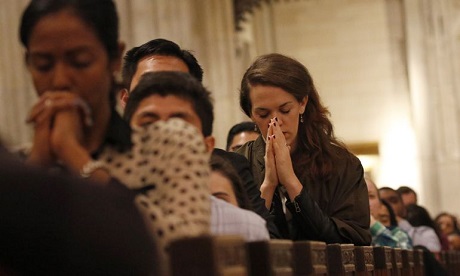Eucharistic adoration – a staple of youth retreats and activities – is pulling young Catholics away from their electronic devices and into quiet reflection.
Kimberly Belcher, a professor of theology at the University of Notre Dame, studied students at three US Catholic campuses who regularly engage in Eucharistic adoration.
She found the absence of connection to the world is at the heart of the appeal. Eucharistic adoration “sets aside the time and space when they will not be interrupted,” she says.
According to Pew Research, there are many Catholics among the 40 percent of American millennials who no longer identify with a particular faith community.
By contrast, the practice of Eucharistic adoration is increasingly popular among young Catholics who publicly embrace their faith. Pew research found about a third of American millennials are regular churchgoers.
Eucharistic devotions were promoted by Pope St. John Paul II in the 1990s.
“It’s always a chance to stop and reset and spend time with the Lord in a tangible way,” a 24-year old student comments.
Others speak of “an immediate sense of peace. You realize it is more than a piece of bread. It is Jesus.”
On one campus, Eucharistic adoration is available 24/7 during the academic year. It also has a social justice dimension: a eucharistic procession in the campus town last year included a plea for unity in the church and nation and an end to racism.
One student says there are times at his campus where the chapel is filled with hundreds of silent prayers. “You can’t become a saint without having a eucharistic prayer life,” another student says.
Belcher discovered many young Catholic social activists immersed in issues of the environment and social justice are among the worshippers. She says many keep their progressive political views after leaving college, while their participation in Eucharistic adoration remains a marker of Catholic commitment.
Bishops are uniformly supportive of the practice.
Cardinal Timothy Dolan has participated in Catholic Underground services, in which – prior to COVID-19 – thousands of worshippers, mostly young people, participated in Eucharistic adoration.
Those who participate are part of “a new minority who give their bishop so much hope,” Dolan says.
Another bishop Sis says the practice nurtures community and a shared sense of belonging among Catholic students.
A youth ministry worker sees Eucharistic adoration as an antidote to much of what ails modern young adults.
It can serve as a badge of Catholic identity, particularly for a generation in which so many young adults have abandoned faith practices, he says.
However, one professor – who is supportive of the practice – has a word of caution too.
She is concerned that the practice puts God into too small of a space (the tabernacle). Healthy Catholic sacramental life sees God’s presence not only in the formal signs of the church but also in the world at large, she says.
Source
Additional readingNews category: World.




